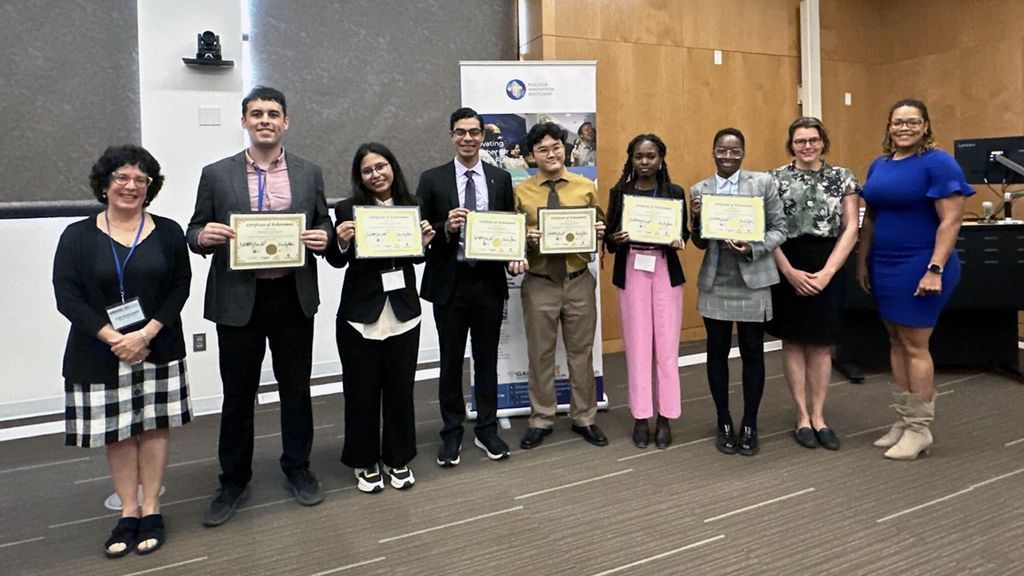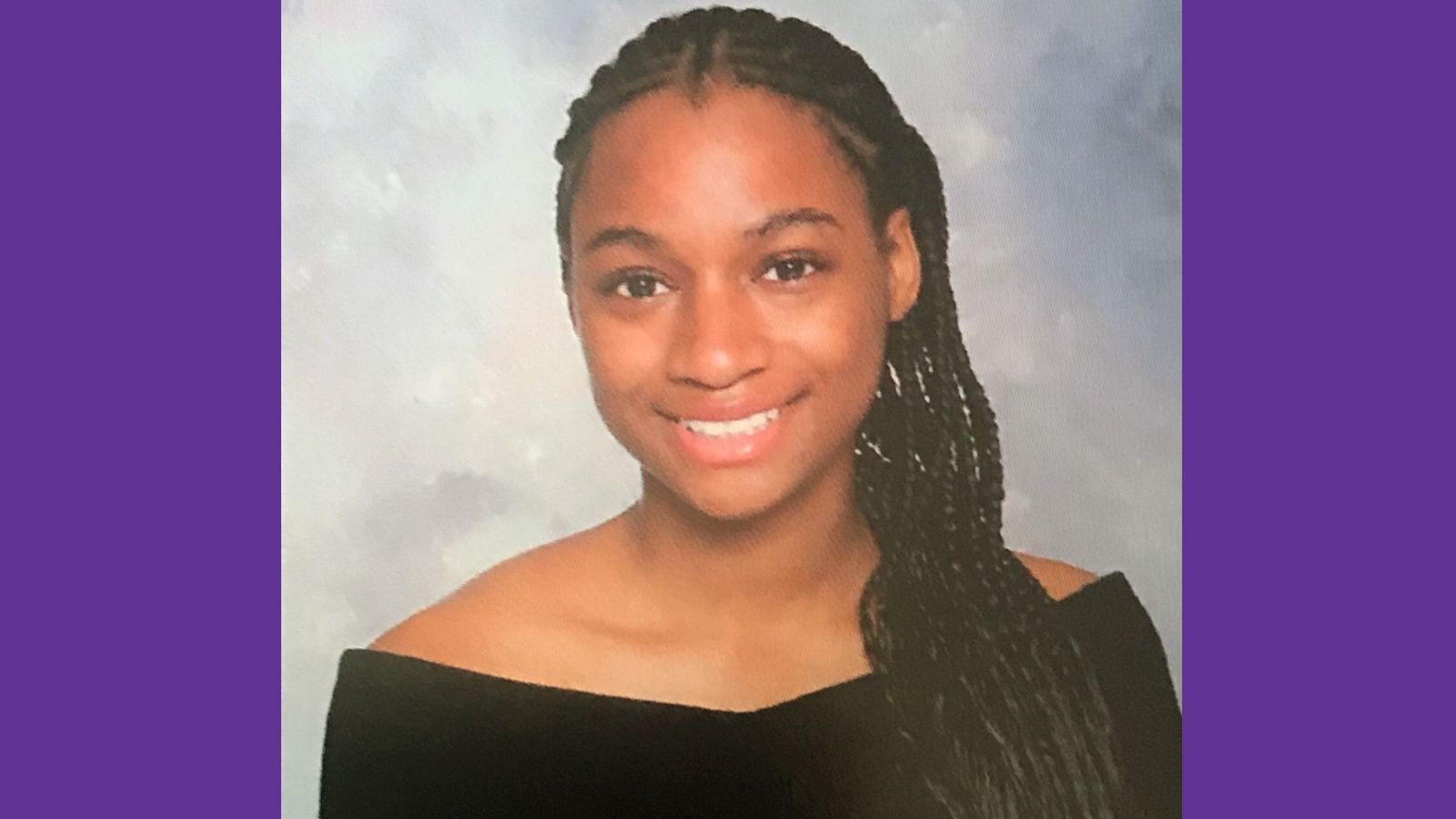She’s a winner!
Recent Hunter Physics graduate Destiny Howell ’24 and her team placed first this summer at the Nuclear Innovation Bootcamp co-hosted by the University of Wyoming School of Energy Resources. The team won a $4,000 prize and an opportunity to present their business idea, a game called CritiCality, at a nuclear conference in Abu Dhabi. Howell will start a Phd program in Space Physics at the University of Texas-San Antonio.
As a low-income, first-generation college student at Hunter, Howell took advantage of several programs designed to support such students, including CUNY Edge and CUNY AstroCom. She was also a fellow at the Cooperman Business Center, which materially supported her participation in the bootcamp.
Hunter Communications asked Howell to talk about her win, life, and her college experiences. Her answers are below.
Please describe yourself.
I earned a BA in Physics. During my time at Hunter, I conducted research in Astrophysics with the Flatiron Institute - Center for Computational Astrophysics, engaged in Astronomy research at the University of Texas at Austin, and worked on a Physics hardware development project at Stony Brook University.
Alongside my passion for science, I am equally enthusiastic about business and entrepreneurship, which led me to the Cooperman Business Fellowship. In my free time, I enjoy exploring the arts through various courses offered at Hunter, such as drawing, photography, collage, and film.
What neighborhood are you from?
I was born and raised in Harlem, and I have deep ties to the community. During the pandemic, my family and I moved to East Harlem. Both neighborhoods have played a significant role in shaping my experiences and personal growth.
Please talk about your family.
I am a first-generation college student from a low-income household. My mother immigrated from Jamaica to the United States with the hope of providing a better future for me and my younger brother. Her sacrifices and dedication have been a significant driving force in my pursuit of higher education. My family has limited resources, but its support and resilience have been instrumental in my academic and personal achievements.
You write about the University of Wyoming Bootcamp: “This opportunity would have been out of reach without your help.” Please describe how the Cooperman Center helped.
The Cooperman Center provided crucial support by covering the registration fee and flight costs associated with the event. As a low-income student, affording some $800 for this opportunity was beyond my means. My family and I rely on CUNY refund checks to manage essential expenses like bills, rent, and groceries. Without the Cooperman Center's aid, attending this life-changing experience would have been out of reach.
How big was your team? What colleges did they come from?
Our team was the largest in the cohort, with six members! What made our team unique was the diverse international background of each member.
We had me; Rahnuma Aziz Nisa from Bangladesh, a PhD student at the University of Wisconsin-Madison; Esther Ollennu from Ghana, also at Wisconsin-Madison as a PhD student; Thomas Viscovich from Argentina, a research fellow; CJ Cruz from the Philippines, entering a master’s program at UC Berkeley; Dennis Rodriguez from Honduras, a student at Universidad Nacional Autónoma de Honduras.

Howell (third from the right) and her team display their certificates.
Please describe your winning idea.
Here’s a quick synopsis: “Nuclear energy is crucial for a sustainable energy future, yet it remains misunderstood and often surrounded by misconceptions. Many young people have little to no exposure to the peaceful uses of nuclear energy, which can influence their career choices and understanding of nuclear technology. Our game, CritiCality, aims to change that.
Set in the control room of a nuclear reactor, this role-playing game allows players to bring the reactor safely to criticality. It not only teaches the process of generating electricity from the splitting of atoms but also highlights its role in reducing greenhouse-gas emissions.”
Please talk about the mentoring you got at Hunter, including in the Physics Department.
Throughout my time at Hunter, I actively sought out and tapped into the resources available to me, which were crucial to my growth as a student and future professional. One of the key support systems I used was CUNY EDGE, a program designed to support low-income students by providing academic, career, and personal development services. I regularly sought guidance from mentors who provided emotional support during challenging times. Their workshops and monthly check-ins helped me stay grounded and focused on my goals. (Thank-you, Tanya, Ariela, and Carly!)
Another significant source of mentorship came from CUNY AstroCom, headed at Hunter by Prof. Kelle Cruz, which supports underrepresented students in astrophysics and related fields. AstroCom provided me with research and career support throughout college.
Thanks to AstroCom, I secured my first research position at the Flatiron Institute, which was a pivotal experience that jump-started my career and professional development. Through AstroCom, I developed essential research skills and a solid physics foundation, which empowered me to tackle complex scientific questions and pursue opportunities at other institutions, such as Stony Brook University and UT Austin. I am deeply grateful to AstroCom for helping me expand my academic horizons.
In Physics, I was fortunate to have a good mentor-mentee relationship with Dr. Steven Greenbaum, one of the most supportive professors in the Physics Department. Dr. Greenbaum's belief in his students is unwavering, and his mentorship was especially valuable when I was faced with the difficult decision of choosing between graduate schools. With his guidance, I was able to make a well-informed decision between attending Brown University for Physics or UTSA-Southwest Research Institute for Space Physics. As the first in my family to pursue a PhD, I leaned heavily on his wisdom, and listening to his advice solidified what was most important to me in this next step of my academic journey.
Another crucial mentorship experience came through the Cooperman Fellowship, which supports business students by providing resources to enhance their professional development. The fellowship offers workshops, training programs in areas such as Excel and financial modeling, and organized trips to visit business companies. This experience was instrumental in preparing me for the business side of my career, complementing my scientific training with essential business skills.
I want to give a huge thanks to Director Naomi Press for believing in my business ideas and encouraging me to trust my instincts. Her guidance inspired me to pursue and excel in the most challenging business programs available, both in and outside the city.
I am incredibly grateful for the mentorship and support at Hunter, which have shaped my academic and professional development. From the emotional and academic guidance provided by CUNY EDGE to the research opportunities and career advice from CUNY AstroCom, and the professional training through the Cooperman Fellowship, each program has helped me reach my goals.
The mentorship I received, especially from Dr. Greenbaum, was pivotal in making informed decisions about my future. As I move forward into graduate studies and beyond, I carry with me the lessons, skills, and confidence these experiences have instilled in me. I am excited to build on this foundation.
What was it like at the conference? Have you been to Wyoming before?
I had never been to Wyoming, and the experience was quite different from what I’m used to in New York City. The peaceful, quiet surroundings were a stark contrast to the fast-paced life back home. The people were incredibly friendly and welcoming, which made my two-week stay even more enjoyable.
The program itself was intensive and challenging, with a steep learning curve as I delved into new material on nuclear science and the nuclear-energy market. It was like a course, with everyone gathered in an auditorium for lectures on business and nuclear topics.
One highlight was the interactive workshops, especially the ideation workshop. It was during this workshop that my team came together, united by a shared vision of creating a game that educates players about nuclear energy.
We also went on field trips to uranium-mining sites, where we learned about the operations and the day-to-day lives of the employees there. The experience provided a valuable perspective on the energy industry. In the second week, we focused on developing and refining our business idea, with daily pitch practices to prepare us for the final presentation. Overall, the conference was both demanding and rewarding, offering a wealth of knowledge and hands-on experience in the nuclear field.
What do you hope to do in Abu Dhabi?
I am excited about the opportunity to achieve several important goals in Abu Dhabi. First, the chance to present our business ideas to a panel of judges and a broader audience is thrilling. It’s not just about showcasing our work, but also about receiving valuable feedback that could refine our project and open new doors for future development.
Networking is another key focus. I’m looking forward to making valuable connections with policymakers, researchers, professors, and industry professionals. These connections could lead to potential collaborations, mentorship opportunities, and a deeper understanding of the global nuclear industry. I believe that building a strong network is essential for personal growth and the advancement of our project.
Visiting Abu Dhabi is also a unique and exciting aspect of this experience. I’ve never been to it, and I’m eager to explore its culture, history, and stunning monuments. Understanding a different part of the world will broaden my perspective, which I can bring back to my work and studies.
Finally, I hope to gain insights into how nuclear innovation is approached globally. Seeing firsthand how different countries tackle similar challenges will be invaluable as I work on our project and in my future career in the nuclear industry.
What do you think will be your focus in Texas?
My focus will be on deepening my expertise in Space Physics through my proposed PhD project, which involves building a spacecraft for an upcoming mission. This opportunity allows me to immerse myself in research, expanding my knowledge in a field I'm passionate about. I'm also eager to explore the business opportunities offered by UTSA because I think it's important to be well-rounded both scientifically and entrepreneurially. I’m excited to grow in both areas.


